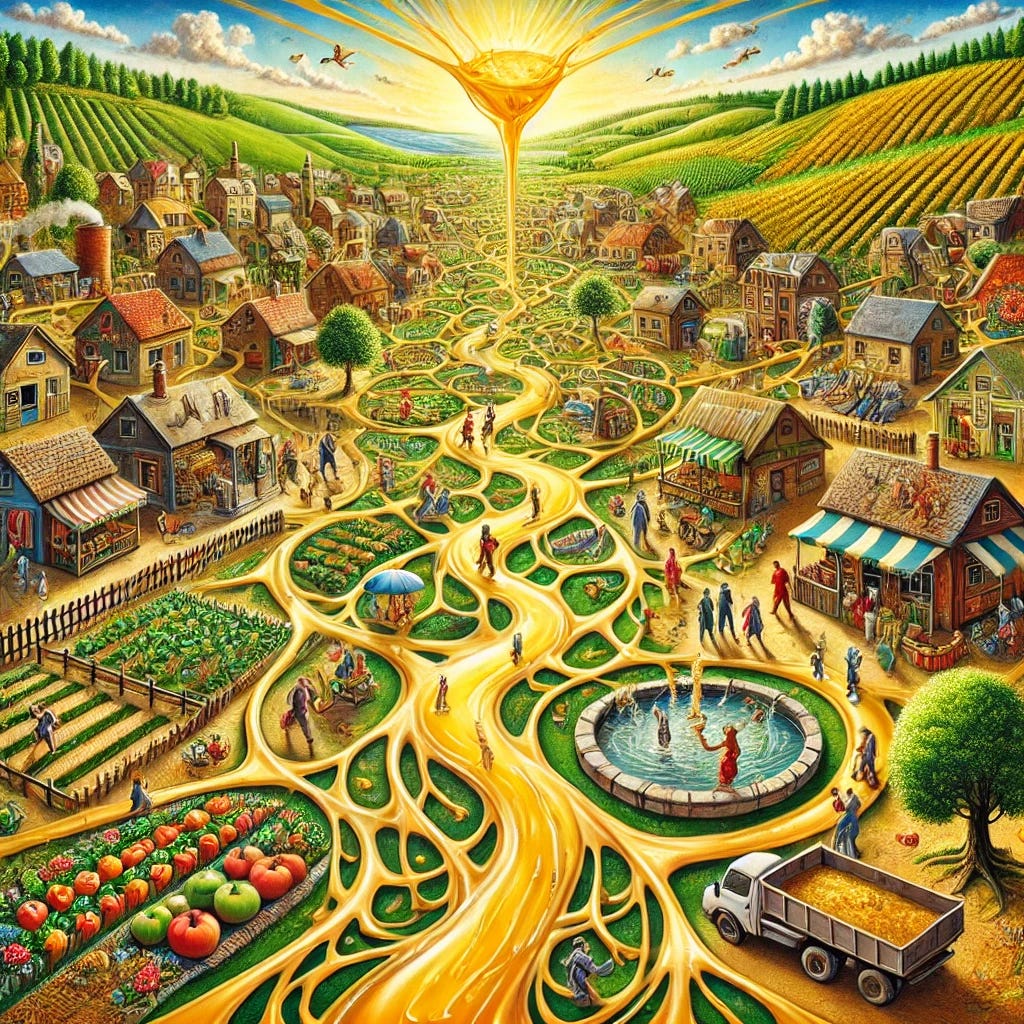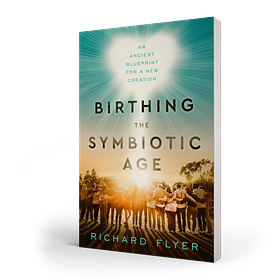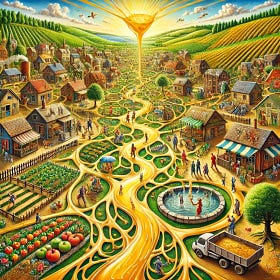The Spirit of the Polis: How Love Outgrows Empire
Last Regular Book Post!
Welcome to the Birthing the Symbiotic Age Book! This special post concludes the book's main sections, which I started sharing in January 2024! I appreciate you all following along and supporting my journey.
The book's concluding section, Activation: A Framework for a Parallel Society Movement, will be released in June 2025 along with the whole book. While not a how-to section per se, it provides a comprehensive framework to activate Symbiotic Culture in any community or network.
If you have not seen it, I suggest reading this previous post on the Parallel Polis first.
Chapter 26: The Spirit of the Polis: How Love Outgrows Empire
Writing this book did more than clarify my thoughts—it changed me. It became a sacred dialogue between my longing to serve and what the Spirit revealed through relationships, reflections, and the truths that emerged along the way.
During the many years of the writing process, I continued to contact individuals, organizations, communities, and networks worldwide—islands of coherence, if you will—that resonated with my passion for Beloved Community and a society based on mutual benefit.
Translating the Sacred: A Language All Can Hear
In keeping with my approach based on Symbiotic Kinship, I sought to connect not just with secular regenerative, civic engagement, and Indigenous spiritual communities but also with traditionally religious ones. By delving deeper into the Christian traditions that informed the Ancient Blueprint I had uncovered, I discovered a wealth of resources, including Christian “apologists” like C.S. Lewis and G.K. Chesterton.
I found terms like “metanoia” and “Logos” and phrases like “unite the Cosmos in Love” courtesy of the 8th-century Eastern Orthodox monk St. Maximus the Confessor.
These “hidden treasures” revealed some of my blind spots and inspired me to find a more universal language to communicate profound religious and spiritual themes.
I am grateful for my readers’ feedback, which helped set me straight!
For example, I was surprised when one of my traditional Christian correspondents took issue with my use of the word “Oneness.” I had assumed Oneness was as inclusive and unifying as it gets. What could be the problem?
Then I had a conversation with a group of Eastern Orthodox men, and their response startled me. In their view, “Oneness” reflects a popular New Age belief that “God, the Universe, and I are One.” While well-intentioned, this view closely resembles pantheism—the belief that God is the universe—rather than theism, which teaches that God is distinct from His creation.
However, the view that God and the physical universe are one directly contradicts theistic religions like Judaism and Christianity.
Judaism, for instance, emphasizes the absolute transcendence of God (YHWH), who is not identical with the created world. Christianity, too, maintains a vital distinction: God is not the universe, but humans are made in His image. As Genesis 1:26 says, “Let us make humankind in our image, after our likeness.”
The De-Platforming of God in the New “Spiritual Age”
The distinction I’ve just described may seem subtle, but to me, it reveals a major blind spot. Many in the “new spirituality” or universalist circles enthusiastically embrace Indigenous and Eastern traditions while reflexively dismissing traditional Christianity. It’s a well-meaning but often misguided trend: an attempt to honor the universality of spiritual experience that flattens differences or erases historical depth.
One common expression of this trend is the belief that “all religions are fundamentally the same” or that we need a single, unifying “One World Religion.”
I am now thoroughly disabused of both notions.
Yes, many religions carry the seed of Divine Love at their core. But to claim that all paths are alike or lead to the same destination is a vast overreach—and, ironically, another form of cultural imperialism.
It’s a hallmark of postmodern relativism: treating a 3,000-year-old faith tradition and a bestselling pop spirituality book as equally authoritative, simply because they both “feel true.”
Imagine the outcry if someone today dismissed Indigenous ceremonies as outdated or superstitious. Why, then, is it socially acceptable—almost fashionable—to speak of Christianity in the same dismissive tone?
This question matters deeply because I’ve spent time among communities that see themselves as the vanguard of a spiritually awakened future. I’ve walked alongside evolutionary mystics, civic network-builders, and regenerative culture movements—many of whom are doing sacred work. But I’ve also seen how easily they overlook, or even belittle, the depth and resilience of traditional Christian faith.
In his seminal book A Secular Age, Canadian philosopher Charles Taylor describes our shift from a time when belief in God was nearly inescapable to a culture in which faith is one option among many. This pluralism has birthed a spiritual smorgasbord. In that buffet line, many who were raised in secular or post-Christian cultures now seek connection through alternatives that sidestep or reject organized religion, especially Christianity.
For many of these seekers—especially those leading social, environmental, and political transformation movements—the idea that God has been “de-platformed” may be new and even provocative. But it’s crucial to name, and here’s why.
We must find a shared spiritual language to create an inclusive Parallel Polis or Symbiotic Society rooted in Divine Love and mutual benefit. That’s why I’ve moved beyond words like “oneness,” which can unintentionally deepen the divide, and chosen more universally resonant terms like “the Transcendent” and “Divine Love.” These terms create space for both the deeply religious and the spiritually open, embracing the nearly 90% of people who believe in some form of Higher Power.
This cultural blind spot—perhaps even a quiet prejudice—has prevented many spiritually inclined, civically active movements from building bridges with traditional religious communities, particularly Christians. Ironically, these religious groups may be their most natural allies in rebuilding trust, reweaving community, and restoring sacred ground in public life.
From Belief to Embodiment: Action Over Ideology
At its core, Symbiotic Culture is not about aligning with a particular belief system. It is about action—embodying the Highest Goodness, the Transcendent, and Divine Love in tangible ways. It’s about making those Virtues real in our lives: in our families, neighborhoods, organizations, communities, and throughout our nation and planet.
As you’ll read in the final section of this book—Activation—holding space for Symbiotic Culture means relentlessly cultivating a field of Symbiotic Kinship. Any viable Parallel Polis must move beyond tribal over-identification. It calls us to become superconscious of opportunities for Intentional Mutual Benefit that transcend and rise above our existing ideological silos.
This has been a hard-won lesson for me. I’m deeply grateful to those who’ve helped me see what I could not see on my own. While sharing this book, I’ve had to confront the invisible beliefs that shaped my own judgments. That confrontation, though uncomfortable, was a gift. Each encounter with my ego became an invitation to move past defensiveness and connect with others heart-to-heart.
It’s this desire for true Symbiotic Kinship that has driven me to explore how we might build networks that include all the Tribes, not just those who think like us. When we gather around shared needs like growing and sharing local food, we begin to remember what unites us.
The deeper I’ve gone into the spiritual foundations of Symbiotic Culture, the clearer it has become -- social and political movements built on opposition—anti-racism, anti-patriarchy, anti-capitalism, anti-West, anti-hierarchy—may raise important truths. Still, they often leave us trapped on the old battlefield.
They cannot bring us to the new playing field where fundamental transformation happens—where we meet, human to human, and co-create the world our hearts know is possible by focusing on our communities’ everyday needs, not just our ideological divisions.
Breaking the Frame: Overcoming Ideological Capture
Speaking above the din of today’s hyper-polarized cultural and political climate has often been disheartening. Many individuals and organizations I once imagined would be at the forefront of Symbiotic Culture now seem captured by the same “progressive” political mindset I had to unlearn to do the radically inclusive community work this path requires.
It’s with humility that I acknowledge how deeply decades ago, I, too, was once embedded in that mindset. I believed that all meaningful political change had to come from the left, and that nearly every problem in our society could be traced back to the institutions of Western Civilization.
I remember the quiet disdain I held for “normies”—those ordinary folks often dismissed as “deplorable” or not enlightened enough to see what I saw or know what I knew. That was my posture during my time as an anti-war, anti-nuclear activist more than forty years ago.
Ironically, these were the very prejudices I had to confront and release to unite diverse San Diego and Reno communities. Now, as I complete the final stages of this book and reach out to networks that might carry its message forward, I sometimes feel estranged from those who could otherwise resonate deeply with Symbiotic Culture—if only they weren’t still fighting the same tired battles.
That’s why so much of what we’ll explore in Section 4, Activation, focuses on lifting well-intentioned people off that exhausted battlefield of ideological warfare and inviting them onto a new playing field—one grounded in the Ancient Blueprint and guided by the shared practice of building something together.
In our current environment, even many organizations whose stated mission is to foster healing, justice, or sustainability still operate from a posture of opposition. They pursue noble goals, yet remain locked in adversarial frameworks. None of these “anti” stances—anti-this, anti-that—are sufficient to birth a new vision. They are, in fact, the very antithesis of what it takes to cultivate a Symbiotic Culture rooted in mutual benefit and spiritual coherence.
The Core Wound is Separation
I do not say this to dismiss or diminish the very real wounds caused by the many forms of domination rooted in Western Civilization—historic racism, sexism, and economic exploitation. These injustices matter deeply. But as long as they are held as isolated grievances, each vying for moral primacy in the hierarchy of suffering, we risk overlooking the deeper issue that unites them all: Separation itself.
It is this spiritual fracture—this disconnection from one another, from the sacred, from the Earth—that underlies the systems of oppression we seek to heal. When we fail to name Separation as the root wound, we fight symptoms rather than address the cause.
This truth becomes even more apparent when working locally—building a food system network, convening a caring circle, or cultivating a modern-day Parallel Polis. In these spaces, abstract political ideologies quickly fall away. The larger frames so often debated in national discourse lose their relevance. What matters is presence, trust, and shared service.
The foundation of these networks—Symbiotic Culture DNA—is mutual regard and inherent equality. These aren’t goals we strive to reach; they are the sacred assumptions we begin with. Inside that space, there is no need to prove worth or demand dignity—it is already woven into the relational fabric.
I want to return for a moment to the Czechoslovakian Parallel Polis we explored earlier in this chapter—how it was grounded in Christian Personalism, the conviction that every human being is made in the Imago Dei, the image of God. Can you see the universality of that truth? It’s the same essence reflected in the Hindu greeting namaste: I honor the Divine in you.
You can even see this transcendent principle embedded in the American Declaration of Independence, mainly crafted by Christians—Anglican, Presbyterian, Congregationalist—who wrote:
“All men are created equal, that they are endowed by their Creator with certain unalienable Rights, that among these are Life, Liberty, and the pursuit of Happiness.”
If that spiritual understanding helped birth one of the most radical and enduring experiments in governance and liberty, maybe—just maybe—it still has the power to guide us home.
The Real Battle Is Within
The growing tendency to demonize Western Civilization often misses a deeper truth: this is simply the latest and most dominant iteration of human empire, now in its inevitable decline. A surprising moment of clarity came while my son Isaac and I watched one of the Viking series on Netflix, which dramatized the invasions of the British Isles over 800 years ago.
As we followed the conquest, vengeance, and cultural upheaval cycles, I was struck by a sobering realization. For all the blame leveled at Western civilization by many of my contemporaries, we must acknowledge a larger pattern—the relentless violence, enslavement, and empire-building that has scarred every civilization throughout recorded history. East, West, Indigenous—no culture is exempt. People of all colors, creeds, and continents have played both victim and oppressor.
That’s when I understood: the real struggle isn’t between civilizations. It’s within the human heart.
Aleksandr Solzhenitsyn captured this eternal truth in The Gulag Archipelago:
“The line separating good and evil passes not through states, nor between classes, nor between political parties either—but right through every human heart—and through all human hearts.”
The “war on evil” that is so often projected onto external enemies—like “The West”—is a losing battle. Those who spend their energy fighting what they oppose often have little capacity to co-create what they long for.
Jesus’ words echo through time: “Resist not evil.” (Matthew 5:39). St. Paul builds on this wisdom: “Do not be overcome by evil, but overcome evil with good.” (Romans 12:21). This is not a call to ignore injustice or submit to wrongdoing. It’s a call to step off the battlefield entirely—to break the trance of the Culture of Separation that insists the only way to defeat darkness is by becoming part of it.
Instead, Jesus gave us a far more radical path: “Love God. Love thy neighbor as thyself.”
This simple command holds profound power. It asks us to renew our connection to the Transcendent and express that Divine Love through embodied service. It invites us to radiate that love into the world—to form circles of trust, cultivate relationships of care, and weave local networks of mutual benefit. This is the blueprint of the modern-day Parallel Polis: global in vision, local in practice.
This isn’t just a beautiful theory to place alongside other high-minded ideals on a pedestal. It is a living imperative, especially now. We are facing a moment not unlike Czechoslovakia in the 1970s, when the totalizing regime silenced truth and suppressed spirit. Václav Havel described a system where the lies you are told eclipse the truth you know in your soul.
Today’s totalizing regime wears a different mask. As I described in an earlier chapter, we live under the soft-cloth authoritarianism of the Everything Industrial Complex. Unlike the blunt-force propaganda of Soviet communism, today’s programming is subtle—so subtle we imagine we are thinking for ourselves.
The 2024 U.S. election only pulled back the curtain. We’ve seen how government agencies have influenced the influencers who influence us. What we’re living through is not unlike the censorship and coercion of the past—just digitized, optimized, and delivered with a smile. And yet, tearing down this so-called “deep state” won’t save us. Like every revolution before it, it risks becoming the next version of the same machine. Or as The Who once sang: “Meet the new boss, same as the old boss.”
We are caught in a struggle between rival factions of oligarchs, each exploiting our tribal instincts—progressive, conservative, religious, secular—to further their power. These factions have no interest in our wholeness, only our allegiance.
That is why the time has come for something wholly different: not a new revolution but a new revelation—a Parallel Polis rooted not in ideology but in love.
It is a living framework grounded in the Ancient Blueprint and animated by the DNA of Symbiotic Culture. Only something this spiritually grounded and relationally resilient can preserve what is left of civil society—perhaps even of our species.
A United Parallel Polis
As I showed in a previous chapter, we now face three parallel visions of the “Parallel Polis,” each shaped—and limited—by a particular mental framework. Whether progressive, conservative, or explicitly Christian, each stream has identified a fragment of the larger problem they resist. Each recognizes, in its way, that true solutions must emerge from the bottom up—through crowd-sourced wisdom and a return to meeting real people’s real needs on the ground.
But what’s missing is the convergence.
Rather than separate movements siloed by worldview, we are being called into something more whole, something deeper and more essential. The task is to find the individuals, communities, and networks within these awakening islands of coherence who can hear the Heart's call. It is not merely a call to fix what’s broken, but a deeper summons to rise above the structures of the mind that keep us divided.
We don’t need three Parallel Polis movements. We need one truly inclusive Parallel Polis that welcomes all people and organizations committed to Intentional Mutual Benefit within each local region. Not united by ideology, but by love. Not by conformity, but by shared care and courageous compassion.
This is the radical shift—the radix, the return to the root—from the old battlefield to a new field of possibility. And it begins not with institutions, systems, or elections, but with each of us—in the quiet center of our being, regardless of the power we think we have, or don’t have.
It begins with the choice to live from the Heart.
Preparing for Activation
In the next and final section of this book—Section 4: Activation—I offer a framework for bringing the Ancient Blueprint to life in your heart, community, and world. This is not a step-by-step manual or a one-size-fits-all prescription. Instead, it is a spacious invitation: to align your life more deeply with the Shared Self, the living current that flows through us all, and to step into your role as a citizen of the Kingdom of Heaven.
This is not an exclusive club. It is a universal calling.
As Solzhenitsyn reminds us, the battle line runs not between tribes or ideologies, but through every human heart. And each of us must choose—every day—whether we will empower the Culture of Separation, which sustains the empires of man, or nurture the Culture of Connection, the living expression of the Kingdom of Heaven.
This Ancient Blueprint is not proprietary. It is transparent, transmissible, and “un-brandable.” Whether you identify as Christian, Muslim, Jewish, Buddhist, Indigenous, atheist, or “spiritual but not religious,” I hope you see how this framework can integrate with—rather than override—your existing path. There is nothing to abandon. There is only something deeper to embody and extend outward into your community.
Symbiotic Culture is not a new religion. It is a relational overlay—a pattern of mutual benefit, self-giving love, and living coherence—that amplifies the Highest Goodness already latent in every tradition. If anything, this book seeks to liberate the essence of Divine Love from the cages of doctrine, ideology, or institutional control.
By now, I trust it is clear that while my own relationship with Jesus Christ has been the wellspring of this work, I am not here to proselytize or impose. With humility and clarity, I assert that the radical understanding of love, reality, and human nature I encountered through Jesus and the Bible has guided my journey and revealed the architecture of the new world we are called to co-create.
While empires have risen and fallen for millennia, what we now face differs. This empire—the global industrial monoculture—reaches every corner of the Earth. There is no opting out. No off-grid escape. No utopian enclave is untouched. To navigate this passage, we must stop, turn inward, and acknowledge—as Solzhenitsyn wrote—that the switching station is in every heart.
Each of us carries both shadow and light. We are all part of the problem—and part of the solution.
This moment in history demands that we face the full weight of our collective trauma and our extraordinary potential. We have reached the threshold. The horror and the beauty converge. We must choose. Will we collapse inward under the weight of separation, or will we rise together in Love?
When we consciously choose to Love God and Love one another—to let Divine Love move through us—we awaken a power that does not merely protest injustice, but transcends it. We dismantle both dominance and anti-dominance, not by overthrowing systems, but by undergrowing and then outgrowing them. We become not just children of God, but adults of Good, taking sacred responsibility for birthing the world to come.
Jesus did not come to fight empires on their terms. He came to reveal a new Kingdom—one built not on domination but on service, humility, and unbreakable Love. I call his vision the Ancient Blueprint, seen not as religious dogma but as a living alternative—a fractal pattern of grace, truth, and radical kinship.
The last part of this book, Section 4: Activation, invites you to step into that now. It presents a living framework—a set of relational patterns, virtues, and practices—a relational worldview—that can ignite grassroots transformation across thousands of communities. This is not a program to follow or a brand to adopt. It is an emergent, global movement already unfolding—a new Symbiotic Culture waiting to be embodied, an ancient pattern seeking life through us, without a name or headquarters.
The threads are ready to be woven in communities around the world. But they need your hands, heart, and voice to help connect them. If you feel the quiet yes inside, this is your moment to lean in. No permission is required.
Welcome to the Activation. Let the birthing begin.
Building Bridges to a New World
Dear Fellow Symbiotes, I have received many requests to share background on the Symbiotic Culture approach.









Your vision for a Symbiotic Culture rooted in love and mutual benefit is very inspiring. I'm now eager to learn more about your book.
"We must find a shared spiritual language to create an inclusive Parallel Polis or Symbiotic Society rooted in Divine Love and mutual benefit. That’s why I’ve moved beyond words like “oneness,” which can unintentionally deepen the divide, and chosen more universally resonant terms"
If Christians cant bring themselves to give verbal agreement to the idea, what makes you think changing the term will help? Fundamentalist Christianitys core tenet is separation. You cant work with them. Its the classic paradox that you can be tolerant to everyone except the intolerant.